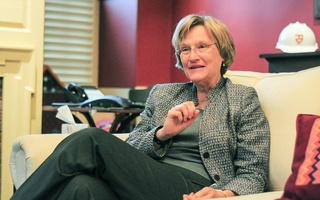{shortcode-5c874a41bd62f47ee9e2b71090fc2fa0217a8e90}
UPDATED: September 8, 2017 at 10:33 a.m.
The Department of Education will review a series of Title IX guidelines that spurred Harvard and universities across the country to overhaul their response to sexual assault on campus, drawing concern from some anti-sexual assault activists at Harvard.
During a speech at George Mason University Thursday, Secretary of Education Betsy DeVos said the department will reconsider the Obama-era policies after a public review process. Addressing a select group of invited students, DeVos called the Obama administration’s interpretation of the landmark anti-sex discrimination law a “failed system,” charging that Obama-era officials had pushed universities to “overreach” in enforcing Title IX.
“Schools have been compelled by Washington to enforce ambiguous and incredibly broad definitions of assault and harassment,” she said. “Too many cases involve students and faculty who have faced investigation and punishment simply for speaking their minds or teaching their classes.”
Current federal guidelines stem from a “Dear Colleague” letter former President Barack Obama’s administration issued in 2011. That letter called on educational institutions to consider sexual assault a violation of Title IX, and mandated that schools respond promptly to sexual assault complaints and adopt a “preponderance of the evidence” standard—a lower standard of proof than the one used in courts of law.
What a policy change might mean for Harvard remains unclear. Since the 2011 guidance, Harvard has established a University-wide Title IX office, unveiled a new policy, and appointed Title IX coordinators at each of its schools. In the ensuing years, the University also faced federal scrutiny; the Law School was found in violation of Title IX in 2014, and the College is still under investigation.
While University spokesperson Tania DeLuzuriaga reiterated Harvard’s commitment to addressing sexual assault in a statement Thursday, she declined to speculate about whether the the University may alter its approach to adjudicating sexual assault complaints down the line.
“Sexual harassment and sexual assault are significant and wrenching problems on college and university campuses across the country, including at Harvard,” University spokesperson Tania DeLuzuriaga wrote in a statement Thursday.
“With renewed focus over the past several years, Harvard has worked persistently to more effectively prevent sexual assault and other forms of sexual harassment, and to respond fairly and thoroughly to allegations when they arise,” she added.
Previously, after DeVos’ confirmation in February, Bill D. McCants, who directs Harvard’s Office for Dispute Resolution, said he did not anticipate a “course change” for Title IX enforcement at Harvard. And Deputy Provost Peggy E. Newell said a “relaxation in requirements” from the federal government would not alter the University’s commitment to addressing sexual assault.
But for others, DeVos’s speech forecast a significant step backwards in combating campus sexual assault. Student anti-sexual assault advocacy group Our Harvard Can Do Better issued a statement Thursday evening condemning DeVos’s decision and urging the University to take immediate action.
“While DeVos claims that she aims to provide justice for assailants on college campuses, in practice this revision merely serves to accommodate such groups’ desire to silence survivors of sexual violence,” the statement reads. “We call on Harvard to immediately confirm that it will not roll back its sexual assault policies in the face of federal backlash.”
Harvard Law professor Janet Halley—who is part of a group of Law School faculty who have repeatedly criticized Obama-era Title IX guidance—said she is pleased DeVos is seeking public input. Halley and three other Law School professors sent a memo to the Department of Education in August, urging the department to scale back its definition of sexual harassment.
“She’s going to go for public comment, which the previous administration never did on this issue. That’s more democratic and I think that’s a good thing,” Halley said, although she later added, “I am by no means declaring an alliance with the Trump administration.”
Stetson University Law professor and Title IX expert Peter F. Lake ’81 called DeVos’s remarks Thursday “a victory for due process”—and an expected one at that. During her confirmation hearing, DeVos indicated she would revisit the federal government’s approach to Title IX, and declined to commit to the 2011 guidelines. She spent the summer attending listening sessions with victims, accused students, and educators around the country.
“It’s not terribly surprising that after so many signals we got that the department appears to want to put more emphasis on due process and procedural safeguards,” Lake said.
The rulemaking process will likely last months and spark widespread debate, Lake said.
“This doesn’t promise to be an easy notice and comment period,” he said. “I would predict that the number of comments could easily be record-setting for the department.”
—Staff writer Hannah Natanson can be reached at hannah.natanson@thecrimson.com. Follow her on Twitter @hannah_natanson.
—Staff writer Claire E. Parker can be reached at claire.parker@thecrimson.com. Follow her on Twitter @ClaireParkerDC
Read more in News
IOP Fellows Clash Over DACARecommended Articles
-
Title IX Office Launches New WebsiteThe central Title IX office's new website provides information about Title IX policies and procedures, continuing a push to better inform students, faculty, and staff.
-
 Title IX Officer Mia Karvonides to Leave Harvard
Title IX Officer Mia Karvonides to Leave Harvard -
Our Harvard Can Do Better Discusses Sexual Assault On Campus“We’re gonna be pushing for a lot of demands that we’ve been quite vocal about in the past,” Amelia Y. Goldberg ’19, a member of the group, said.
-
 Faust Talks DACA, Title IX in CBS Interview
Faust Talks DACA, Title IX in CBS Interview -
If Betsy DeVos Won’t Do It, Harvard MustHarvard must combat the narrative of DeVos’s decision—automatically doubting survivors’ allegations of sexual assault—and, instead, fully attend to students involved in sexual harassment cases.













